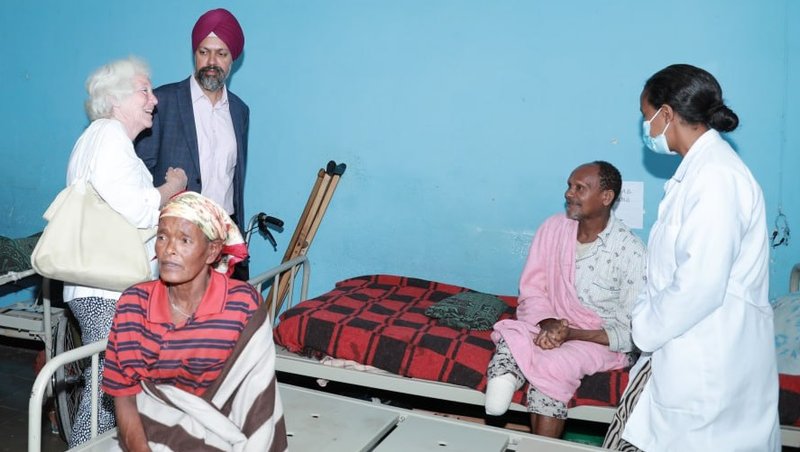If you could help one person today, who would it be?
Peter Waddup, CEO - The Leprosy Mission Great Britain
Politics is all about winning hearts and minds to create change. With a General Election on 4 July, MPs are setting out their vision for a better Britain. They are making impassioned pleas to win the support of individuals in a bid to secure the votes of the masses.
This week we are hoping we might have won the hearts and minds of politicians! We were excited to share leprosy work with five parliamentarians visiting Ethiopia. The politicians belong to the All-Party Parliamentary Group for Malaria and Neglected Tropical Disease. They are in a powerful position to influence the Overseas Aid budget. While neither Labour nor the Conservatives are pledging to return Overseas Aid to its rightful 0.7% of Gross National Income, these five people can help the world's poorest.
A world away from Westminster, the parliamentarians saw people struggle with the cruel effects of leprosy. This was at the Alert Hospital on the edge of Ethiopia’s capital, Addis Ababa. Leprosy was defeated in Britain in the 18th Century after great improvements were made to public health. And it is a disease that we, as a nation, have a global responsibility to help end today.
Outside Alert Hospital, is the terrible Woreda 1 slum. The slum has grown up around the hospital. It is home to thousands of people living in indescribably awful conditions.
The exemplary care given free of charge to leprosy patients at Alert Hospital sees people travel across Ethiopia for treatment. Many ending up staying in the slum afterwards. This is because prejudice, disability or economic hardship prevent them from going home. The hospital provides comfort and respite from this as they are treated with the kindness they deserve. While we have made improvements to the toilet and wash facilities in the slum, a visit to Woreda 1 would be unforgettable for the parliamentarians.
Amidst a hospital treating hundreds and a slum housing thousands, I hope each politician was able to talk to a person affected by leprosy. Changing the world can seem too big a task - even for politicians! Yet politicians are human beings who are driven by human stories. And seeing what could be done to spare one person's pain is a good place to start.
It got me thinking about the stories I have heard at The Leprosy Mission, firstly as a volunteer and over the past seven years as Chief Executive. It made me realise how far we'd go for a person we have built a connection with. The person who was once one of the 1.6 billion people we didn't know in the world suffering with a Neglected Tropical Disease. But when we forge a connection with them it is like a black and white photo morphing into technicolour. We feel the injustice, their pain and we want to make things right.
I had a situation last year where I was contacted by the now former UN Special Rapporteur on discrimination against persons with leprosy. Alice Cruz told me about a young man with leprosy, in a country we cannot name, who couldn't get treatment. Because of the discrimination surrounding the disease, he was beaten each time he left the family home. His father lost his job as a result of the prejudice and they even had their home set on fire. Alice asked what we could do to help.
We managed to get this young man to a neighbouring country where we work. It wasn't easy. But thankfully his leprosy was cured and the resulting terrible ulcers were treated. After 12 months of getting to know this young man, I am in awe of the resilience and bravery he has shown. He's made me more determined than ever to do whatever we can, however difficult the circumstances may seem, to come together as a global family. Because together we can make the impossible possible.

I am really grateful to the five parliamentarians for taking the time to visit Ethiopia. I hope that on boarding their flight home to the UK, they were filled with a similar confidence. A confidence that with the right care and investment, they can bring about justice. They can see Britain lead the way to ending Neglected Tropical Diseases like leprosy, once and for all. Because if the political will is there, then there will always be a way.